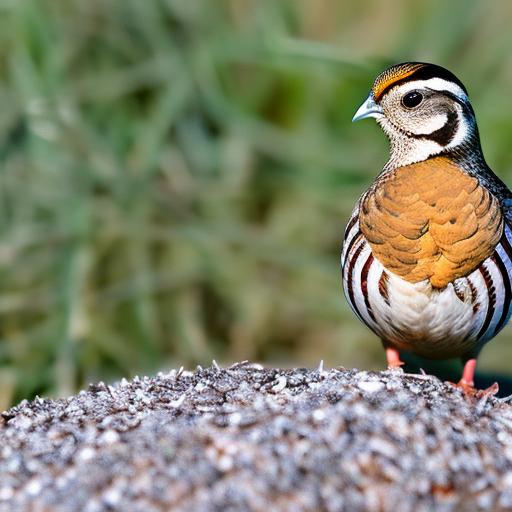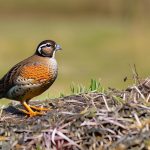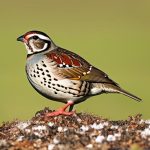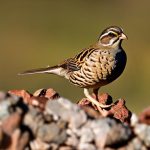Quails are small, ground-dwelling birds that have gained popularity as pets in recent years. They are known for their gentle nature, low maintenance, and entertaining behavior, making them an ideal choice for bird enthusiasts looking for a unique and charming pet. Quails come in a variety of species, each with its own distinct characteristics and requirements. From the colorful Coturnix quail to the elegant Bobwhite quail, there is a species of quail to suit every pet owner’s preferences.
Quails are social birds that thrive in small flocks, making them a great choice for those looking to keep multiple birds as pets. They are also relatively quiet compared to other bird species, making them suitable for apartment living or homes with noise restrictions. Additionally, quails are known for their ability to lay eggs, making them a popular choice for those interested in sustainable living and self-sufficiency. With the right care and attention, quails can live for several years, providing their owners with companionship and joy. In this article, we will explore the various aspects of keeping quails as pets, including choosing the right species, housing and enclosure requirements, diet and nutrition, health and veterinary care, behavior and enrichment, as well as tips for bonding and interacting with these delightful birds.
Key Takeaways
- Quail make great pets due to their small size, low maintenance, and friendly nature.
- When choosing a quail species, consider factors such as size, egg production, and temperament.
- Quail require a secure enclosure with proper ventilation, bedding, and space for foraging and dust bathing.
- A balanced diet for quail includes commercial feed, fresh greens, and grit for digestion.
- Regular health check-ups, parasite prevention, and proper handling are essential for maintaining quail health and well-being.
Choosing the Right Quail Species
When it comes to choosing a quail species as a pet, it’s important to consider factors such as size, temperament, and egg-laying capabilities. The Coturnix quail, also known as the Japanese quail, is one of the most popular choices for pet owners due to its small size, colorful plumage, and prolific egg-laying abilities. These quails are known for their friendly and sociable nature, making them a great choice for those looking for a bird that enjoys human interaction. On the other hand, the Bobwhite quail is a larger species known for its striking appearance and distinctive call. While they may not be as prolific egg layers as Coturnix quails, Bobwhite quails are valued for their beauty and unique vocalizations.
For those looking for a more exotic option, the Button quail, also known as Chinese painted quail, is a popular choice. These tiny quails are known for their intricate markings and endearing behavior, making them a favorite among bird enthusiasts. It’s important to research each species thoroughly before making a decision, taking into account factors such as space requirements, social needs, and egg-laying capabilities. Additionally, it’s essential to ensure that the species you choose is legal to keep as a pet in your area, as regulations regarding pet quails can vary depending on location.
Housing and Enclosure Requirements
Quails require a suitable living environment that provides them with enough space to move around freely while also keeping them safe from predators and the elements. When it comes to housing pet quails, there are several options to consider, including indoor cages, outdoor aviaries, and custom-built enclosures. For indoor housing, a large wire cage with a solid bottom is recommended to provide ample space for the quails to move around and stretch their wings. It’s important to line the bottom of the cage with a soft bedding material such as straw or wood shavings to provide comfort and absorb waste.
Outdoor aviaries are another popular choice for housing pet quails, providing them with access to natural sunlight and fresh air. These enclosures should be constructed with sturdy wire mesh to prevent predators from gaining access and should include areas of shade and shelter to protect the quails from extreme weather conditions. Custom-built enclosures can also be constructed to suit the specific needs of pet quails, providing them with ample space to roam and explore while ensuring their safety and well-being. Regardless of the type of housing chosen, it’s important to provide perches and hiding spots for the quails to feel secure and comfortable in their environment.
Diet and Nutrition for Quail
Proper nutrition is essential for the health and well-being of pet quails. A balanced diet should include a combination of commercial quail feed, fresh fruits and vegetables, and access to grit and calcium supplements. Commercial quail feed is specially formulated to meet the nutritional needs of quails and should make up the majority of their diet. It’s important to choose a high-quality feed that is appropriate for the age and breed of your quails, ensuring that they receive the necessary vitamins and minerals for optimal health.
In addition to commercial feed, pet quails should be offered a variety of fresh fruits and vegetables as part of their diet. Leafy greens such as spinach and kale, as well as fruits like berries and melons, can provide essential nutrients and enrichment for quails. It’s important to avoid feeding quails any toxic or harmful foods such as avocado or chocolate, as these can be detrimental to their health. Additionally, providing access to grit and calcium supplements is essential for quails to aid in digestion and support strong eggshell formation in laying hens. Fresh water should always be available to quails, provided in shallow dishes or water dispensers that are easy for them to access.
Health and Veterinary Care for Quail
Maintaining the health of pet quails is essential for their long-term well-being. Regular health checks should be conducted to monitor the overall condition of the birds, including their weight, feather quality, and behavior. Any signs of illness or injury should be addressed promptly by a qualified avian veterinarian to ensure that the quails receive appropriate treatment. Common health issues in pet quails can include respiratory infections, parasites, and egg-binding in laying hens.
Preventative measures such as regular cleaning of the enclosure, providing a balanced diet, and minimizing stress can help reduce the risk of health problems in pet quails. It’s important to observe the behavior of your quails closely and familiarize yourself with signs of illness or distress so that you can take action quickly if needed. Additionally, practicing good biosecurity measures can help prevent the spread of diseases among your quail flock. This includes quarantining new birds before introducing them to existing flocks and practicing proper hygiene when handling the birds or their environment.
Quail Behavior and Enrichment
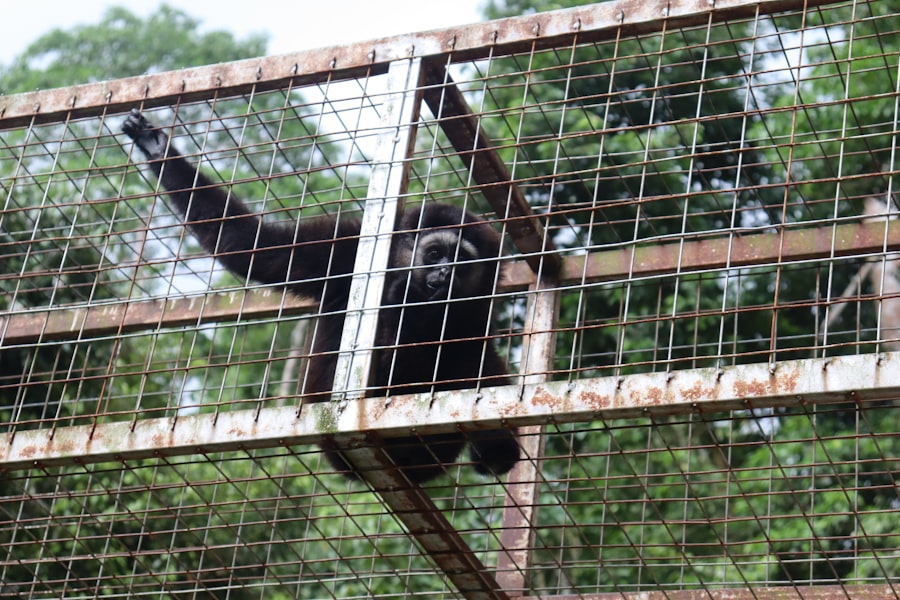
Quails are social birds that thrive in small flocks, displaying complex social behaviors such as grooming each other, communicating through vocalizations, and establishing pecking orders within the group. Providing enrichment activities for pet quails can help stimulate their natural behaviors and prevent boredom. This can include providing perches at different heights within the enclosure, offering hiding spots such as tunnels or boxes, and providing opportunities for dust bathing.
Quails are also known for their love of scratching and pecking at the ground in search of food, so providing access to a variety of substrates such as sand or soil can help satisfy this natural behavior. Additionally, introducing novel objects into the enclosure such as mirrors or hanging toys can provide mental stimulation for pet quails. It’s important to rotate enrichment items regularly to keep the birds engaged and prevent habituation.
Tips for Bonding and Interacting with Your Pet Quail
Building a strong bond with pet quails can be a rewarding experience for both the birds and their owners. Spending time with your quails on a daily basis can help build trust and familiarity between you and your birds. This can include sitting near their enclosure and talking softly to them, offering treats by hand, or simply observing their behavior from a distance.
It’s important to approach pet quails calmly and gently to avoid causing them stress or fear. Quails can be skittish by nature, so it’s essential to move slowly around them and avoid sudden movements or loud noises. Over time, many pet quails will become more comfortable with human interaction and may even seek out attention from their owners.
When handling pet quails, it’s important to support their body properly and avoid grabbing them forcefully. Instead, gently scoop them up from underneath using both hands to provide support and security. It’s important to allow your quails to become accustomed to being handled gradually, starting with short periods of interaction before gradually increasing the duration over time.
In conclusion, keeping pet quails can be a rewarding experience for bird enthusiasts looking for a unique and charming companion. By choosing the right species, providing suitable housing and nutrition, maintaining their health through veterinary care, enriching their environment with stimulating activities, and building a strong bond through positive interaction, pet owners can ensure that their quails lead happy and fulfilling lives in captivity. With proper care and attention, pet quails can bring joy and companionship to their owners for many years to come.
If you’re considering keeping a quail as a pet, you may also be interested in learning about the dietary needs of ducks. Poultry Wizard offers a helpful article on what to feed ducks, which can provide valuable insights into the nutritional requirements of various poultry species. Understanding the specific dietary needs of different birds can help ensure that your quail and other feathered friends receive the proper nutrition for their health and well-being. Check out the article here.
FAQs
What is a quail?
Quails are small ground-dwelling birds that belong to the family Phasianidae. They are known for their distinctive calls and are often found in a variety of habitats, including grasslands, woodlands, and agricultural areas.
Can quails be kept as pets?
Yes, quails can be kept as pets. They are relatively low-maintenance and can be a great addition to a backyard or small farm.
What do quails eat?
Quails are omnivorous and eat a variety of foods, including seeds, insects, and small plants. In captivity, they can be fed a commercial game bird feed or a mixture of seeds and grains.
How much space do quails need?
Quails do not require a large amount of space and can be kept in a relatively small enclosure. However, they do need enough room to move around and forage, so a minimum of 1 square foot per bird is recommended.
What kind of housing do quails need?
Quails can be housed in a variety of enclosures, including wire cages, aviaries, or chicken coops. It’s important to provide them with a secure and predator-proof shelter, as well as a dry and clean environment.
Do quails need companionship?
Quails are social birds and do best when kept in small groups. It’s recommended to keep at least 2-3 quails together to provide them with companionship and reduce stress.
Are quails noisy?
Quails are known for their distinctive calls, which can be quite loud, especially during the breeding season. However, some quail species are quieter than others, so it’s important to research the specific breed before getting quails as pets.
Are quails good for beginners as pets?
Quails can be a good choice for beginners as they are relatively easy to care for and can adapt well to a variety of environments. However, it’s important to do thorough research and understand their specific needs before getting quails as pets.
Meet Walter, the feathered-friend fanatic of Florida! Nestled in the sunshine state, Walter struts through life with his feathered companions, clucking his way to happiness. With a coop that’s fancier than a five-star hotel, he’s the Don Juan of the chicken world. When he’s not teaching his hens to do the cha-cha, you’ll find him in a heated debate with his prized rooster, Sir Clucks-a-Lot. Walter’s poultry passion is no yolk; he’s the sunny-side-up guy you never knew you needed in your flock of friends!

